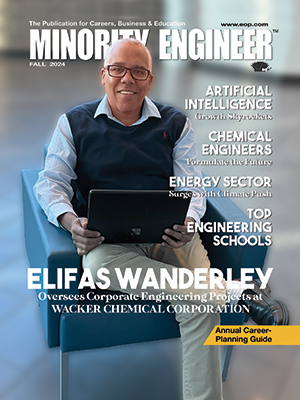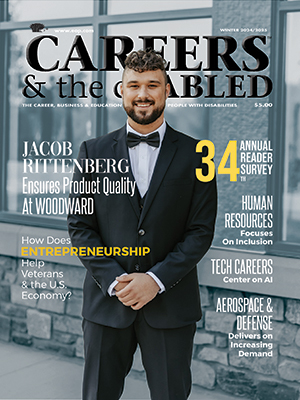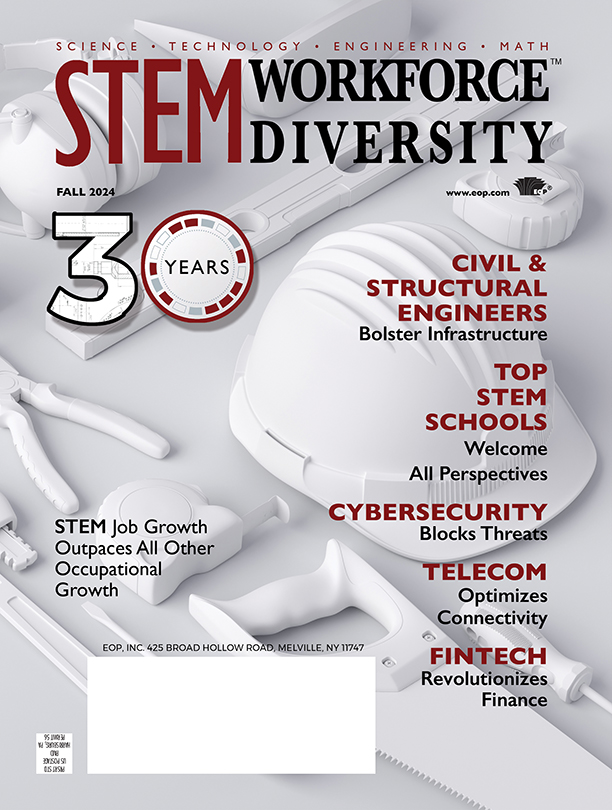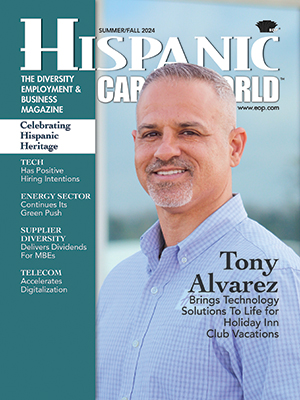By Sandra H. Shichtman
The energy/gas/utilities industry has been trending toward being increasingly more eco-friendly for years now, especially in the last few years, opening up more opportunities.
Energy/gas/utilities has been trending toward being increasingly more eco-friendly ways to produce and provide power for years now, especially in the last few years, opening up more opportunities. It’s also setting up renewable energy to truly take off as the push and demand for global, environmentally friendly power solutions continue. Learn more from the energy professionals featured here.
Chapa Designs & Develops Substation Layouts for AEP
Benino Chapa, Jr. came to American Electric Power (AEP), a leading regional electric utility company serving customers in 11 states, with a bachelor’s degree in electrical engineering, an associate degree in business administration, and work experience garnered during the global coronavirus (COVID-19) pandemic that includes one position as an electrical engineering intern, which, he indicates, helped him get real world experience and enabled him to learn about different points of view.
“The Great Texas Freeze is the main reason I became focused on the electric power industry,” Chapa explains about the deep freeze that covered most of Texas in February 2021, leaving several million homes and businesses with no power. “I wanted to make a difference for the state of Texas and my hometown of Edinburg.”
Chapa came on board at AEP in November 2021, and worked on station outage scheduling in the Central Texas region. “I really enjoyed the work culture and how everyone I encountered had a ‘mi familia’ spirit.”
He then interviewed through a video chat to work as a station engineer. In August 2022, he became an engineer for AEP and relocated to Tulsa, OK.
Currently, Chapa is a transmission substation engineer for the Texas central area, where his responsibilities are to design and develop substation layouts while deciding which equipment specifications are needed to construct substation projects in Central Texas.
Promotions from engineer associate to engineer, senior engineer, and, finally, to principal engineer are available, according to Chapa. “To be a principal engineer, you’d need to become certified as a principal engineer (PE),” he notes, adding, “I learned that there’s always room for growth in AEP.”
Movement into management is also available. “I’d need more work experience to move up to managerial,” he shares about his own experience and career path at AEP. “For my department it would be a minimum of six years to transition up.”
The college degree an individual needs depends on the role and the department, Chapa further points out. For instance, “a master’s degree isn’t needed for me, but it does help for other roles and departments.”
The company will provide assistance in the form of reimbursement, should a degree be beneficial for both the employee and the company, elaborates Chapa, who’s focused on becoming a PE.
Chapa has been nominated to become chair of the Hispanic Origin Latin American (HOLA) employee resource group (ERG), one of nine ERGs at AEP. He was also invited to join the energy delivery unit’s diversity, equity and inclusion (DEI) group as a liaison.
Open positions with Columbus, OH-headquartered American Electric Power (AEP) are posted at aep.com/careers. Connect on X, Facebook, LinkedIn and YouTube.
Hernandez Manages Resources for SLB’s New Energy Division
Today Viviana Hernandez is a resources manager at SLB. As such, “I’ve taken responsibility for implementing sales and operations processes, overseeing resource allocation, and managing cross-functional collaboration,” she summarizes.
More specifically, Hernandez supports SLB’s new energy division, which is a new and growing division within the company.
“My responsibilities span multiple functions within the supply chain domain. These include procurement, sourcing, materials management, and logistics. This broad scope allows me to engage with every phase of our supply chain operations, ensuring a comprehensive approach to optimizing efficiency and driving growth,” she details.
She came on board at SLB as a procurement specialist focusing on processing purchase orders. Her career progressed to more autonomous positions within strategic teams until she reached her current position.
Throughout her various roles at SLB, Hernandez has been informally mentored by both managers and colleagues. She’s taken advantage of the mentorship program at SLB’s Connect Women employee resource group (ERG).
“This program has connected me with mentors from across the globe and across diverse functions, providing me with valuable insights and perspectives that have further enriched my experience and broadened my professional horizons,” Hernandez notes.
She’s also allied with other ERGs, the Black Organization for Leadership and Diversity (BOLD), LGBT+ Allies, and the ThisAbility Network, which is focused on disability, health conditions, and caregivers.
Outside of SLB, she serves as president of the Houston chapter of the Association of Latino Professionals for America (ALPFA), a group dedicated to empowering and developing Latino men and women as leaders in all sectors of the global economy.
There were several things that drew her to SLB and to energy sector. Specifically, she chose to work in the oil services industry because of its dynamic and challenging environment where she could apply her skills to solve complex problems and make an impact. The industry also provides opportunities for continuous learning and professional growth.
“With the rapid advancements in technology and the industry’s focus on sustainability and innovation, I was excited about the potential to work on cutting-edge projects and develop solutions that address both operational challenges and environmental concerns,” she elaborates.
The collaborative nature of the oil services field attracted her, as well.
“Working with a diverse team of experts from different disciplines and backgrounds enriches my experience, and has allowed me to contribute to projects that require a multifaceted approach,” adds Hernandez, who completed two internships focusing on sales and marketing while studying for her undergraduate degree that she earned in 2015.
“These experiences not only provided valuable insights into the business world, but also helped me realize my growing interest in the complexities of supply chain. Consequently, during my senior year, I made the decision to change my major to supply chain management,” she recalls.
Her internships helped her her develop and hone such soft skills as project management, effective communication and problem-solving. These soft skills were transferrable to supply chain management, according to Hernandez, and helped her in her pursuit of her first role at SLB as a procurement specialist.
“These skills enabled me to approach challenges with a fresh perspective and contribute meaningfully to the procurement department,” reflects Hernandez, who was ultimately hired by SLB after graduation.
The company’s openness to career mobility and exploration was a key factor in her decision to join SLB, a global company that drives innovation in accessing energy. “SLB is known for its culture of innovation, continuously evolving to improve our processes, products, and services,” she notes.
“The possibility of working anywhere around the globe or seamlessly transitioning into a different discipline, such as human resources (HR) or sales, was incredibly appealing. This flexibility not only aligns with my desire for diverse professional experiences, but also reflects SLB’s dedication to fostering growth and development,” she continues.
“I thrive in roles that push me to broaden my skill set and embrace new challenges, and the company’s commitment to progress ensures that there are always new and exciting opportunities for growth and development.”
To foster career growth, the company offers internal courses designed to familiarize employees with different roles and skill sets, and encourages them to pursue external courses relevant to their career goals. “Depending on their current role, management might provide flexibility with working hours and offer reimbursement for these external courses,” she adds.
SLB employees who want to move into management are able to discuss their career aspirations with both management and HR during their scheduled quarterly or annual reviews. “These discussions are an opportunity to develop a personalized plan, identifying the skills and roles necessary to prepare for their desired position,” she further points out.
Open positions with Houston, TX-headquartered SLB are posted at careers.slb.com. Connect on LinkedIn, YouTube, Facebook and Instagram.
Cantu Leads a Team of Talent Recruiters at Marathon Petroleum
Before joining Marathon Petroleum, Christopher Cantu spent 10 years as a teacher and almost four years at a non-profit organization. While his prior work experiences and university degrees weren’t related to the energy industry, his responsibilities were similar to those he has now in his current role as a talent acquisition manager, campus and emerging talent at the company.
“They include relationship building, workforce development, recruitment and community engagement,” cites Cantu, who believes that, “as our global population continues to grow, so will the demand for affordable and reliable energy and chemical products. Companies like Marathon exist to help meet this societal need while also maintaining the highest standards for safety and environmental care.”
This will require a steady talent pipeline to meet this demand and maintain these standards. To that end, at Marathon, a petroleum refining, marketing, and transportation company, Cantu and his team are tasked with sustaining the company’s future talent pipeline.
“The team collaborates with more than 45 colleges and universities across 21 states to recruit candidates for internships and co-ops that fill priority positions in multiple business lines within the company,” he details.
It works with Marathon’s departments to understand their business needs, and it pairs those needs with appropriate schools.
“The team also collaborates with advocacy and leaders, organizations such as the Society of Women Engineers (SWE), Society of Hispanic Professional Engineers (SHPE) and American Indian Science and Engineering Society (AISES) to build relationships with strong candidates from a broad range of backgrounds,” he adds.
Cantu meets regularly with his team to support their growth and ability to build a strategy that’s reflective of these hiring needs while also helping the company sustain key relationships with local colleges, universities, and community organizations.
“I’m able to engage with various community members, university leaders and individual students to help them learn more about Marathon’s role in the energy industry and how we offer rewarding and lasting careers,” he elaborates.
The fact that his father worked in the petrochemical field for most of his career also provides Cantu a unique perspective as a second generation working in the energy industry that he uses in his recruiting. “I’m able to speak frankly about how the energy industry opens many doors for those seeking upward economic mobility, to enter the middle class, and improve quality of life for their loved ones,” he points out.
In addition to his recruitment work, Cantu is a member of and supports many of Marathon’s employee network groups (ENGs) where he works in the San Antonio, TX location.
“[They] promote inclusivity and respect among employees, and connect them with others who have a shared identity and life experiences. Seven ENGs, focusing on Asian, Black, Disability, Hispanic, LGBTQ+, veterans, and women, promote those goals, and connect colleagues from across the company, providing opportunities for development, networking, and community involvement,” he concludes.
Open positions with Findlay, OH-headquartered Marathon Petroleum are posted at marathonpetroleum.com/jobs. Connect on Facebook, X, LinkedIn, YouTube and Instagram.
Caldentey Manages Project Controls at Williams
Juan Carlos Caldentey chose to follow his parents into the energy industry where they worked as engineers. “It’s a global business that matters to every person around the world, and it’s always changing in terms of technology,” he underscores.
Caldentey knew about Williams, where he works now, because of its presence in Tulsa, OK where he earned his master’s degree in petroleum engineering in 2000. He was also aware that the company did business in his home country of Venezuela where he’d previously earned his bachelor’s degree in mechanical engineering.
He joined Williams, which processes and transports natural gas, and did rotational training as a plant engineer at the company, learning about the operation and maintenance of gas processing facilities. When Williams was commissioning high gas pressure plants in Venezuela, he relocated. “I worked in Venezuela for seven years in different roles such as leader of technical services, operation supervisor and plant superintendent.”
Returning to the U.S., and wanting to learn more about the business and the way organizations work, he earned an MBA in 2011. “I decided to work on growing our domestic business in the U.S., helping project managers deliver projects on time and budget, and, with company leaders, help them manage capital for expansion and maintenance projects,” he explains.
He was promoted to manager of front-end engineering and design, and, from there, was promoted into his current position as manager of project controls for the transmission and gulf of Mexico operating area.
“We support the execution of capital growth and maintenance projects, and provide detailed analyses, including cost and schedules, to the project managers so that their teams can execute projects safely, on time, and on budget,” describes Caldentey, who also provides detailed information to leaders and stakeholders so they can make sound and proactive critical decisions that will yield optimal results.
He reflects on his earlier career at Williams, beginning as an individual contributor working in different roles supporting operations and maintenance, being promoted to a manager of operation, including technical services, moving back to an individual role as an engineer supporting projects, being promoted again to manager of front-end engineering and design, and then being promoted into his current position.
Going forward, he sees himself, eventually, as a director of project execution, but only after taking on some commercial roles that will help him better understand Williams’ business and customers.
He feels that all of that career movement and growth, and all of his roles, provided him with crucial cumulative experience that continues to inform his work today, expands his knowledge, and opens up opportunities to achieve his future career aspirations.
This is now advice and insight he offers to others: “In my experience, moving laterally, and up and down, from manager to individual contributor roles, is critical to broadening your knowledge and expanding your opportunities.”
During his career, Caldentey has also had technical and leadership training opportunities and has also received coaching. “I had a few key leaders as my sponsors and mentors who helped me plan for my career and were critical for my success,” he recalls.
He now has a few mentees. He assists them with their careers and works with other leaders to help these mentees accomplish their career goals.
Caldentey is also on the leadership team of the Latin Employee Resource Group (LERG), which works with other companies and institutions to share ideas about how to make the company’s workforce more diverse and inclusive. “I joined the organization because I want to promote Latin culture and support our communities,” he notes.
He’s also a member of the Association for the Advancement of Cost Engineering (AACE) and has been a director of the board for the Houston Latin Philharmonic.
Open positions with Tulsa, OK-headquartered Williams are posted at williams.com/careers. Connect on LinkedIn, Facebook, X, Instagram and YouTube.
Clean Energy Boom
The clean energy sector has been booming for the past couple of years thanks to the push by the federal government toward sustainability and climate goals.
To wit, according to the U.S. Department of Energy (DOE), the energy sector has already added nearly 300,000 jobs from 2021 to 2022. And, going forward, private-sector companies across the U.S. are investing more than $360 billion in almost 600 clean energy projects that will add almost 313,000 new jobs. This includes the automobile industry, whose sales of electric vehicles (EVs) grew by more than 35% in 2023, according to the U.S. Bureau of Labor Statistics (BLS).
The gas, oil, and utilities sectors are also concerned with the environment, seeking ways to provide their customers with products that are environment-friendly.
Also accelerating the push to greener solutions to shore up security and resilience of supply are geopolitics, wars and supply chain issues in a post-global coronavirus (COVID-19) pandemic world. While worldwide job markets remain in flux, energy has been among the fastest evolving industries globally in the last five years.
In fact, clean energy transitions and efforts to decarbonize energy are the prevailing trend reshaping global energy employment that will ultimately create 14 million new jobs related to clean energy technologies.
All of this energetic growth should result in a greater range of opportunities for those wishing to enter or advance their careers in the overall energy/gas/utilities industry, and help move sustainability solutions forward and spark positive change for the environment.
Benino Chapa, Jr. is a transmission substation engineer for the Texas central area for American Electric Power (AEP).
“The Great Texas Freeze is the main reason I became focused on the electric power industry.”
Viviana Hernandez is a resources manager at SLB.
“With the rapid advancements in technology and the [oil services] industry’s focus on sustainability and innovation, I was excited about the potential to work on cutting-edge projects and develop solutions that address both operational challenges and environmental concerns.”
Christopher Cantu is a talent acquisition manager, campus and emerging talent at Marathon Petroleum.
“[As the second generation of my family in energy], I’m able to speak frankly about how the energy industry opens many doors for those seeking upward economic mobility, to enter the middle class and improve quality of life for their loved ones.”
Juan Carlos Caldentey is a manager of project controls for the transmission and gulf of Mexico operating area at Williams.
“[Energy is] a global business that matters to every person around the world, and it’s always changing in terms of technology.”







